Civil War Confederate POW Letter Fort Delaware Prison to Northern Schoolmate
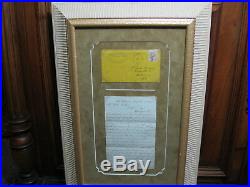

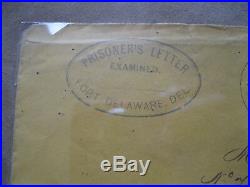
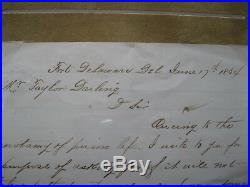
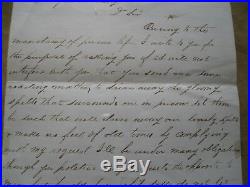
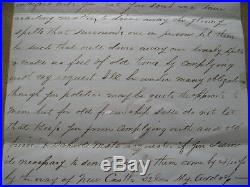
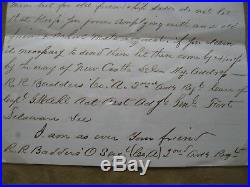



School mate verses school mate. Here is a fascinating historical and rare one of a kind letter with cover from a Confederate Soldier, Robert R. Badders to his Northern Friend and school mate, Taylor Darling, both of whom were from Baltimore, Maryland, asking him to put his political differences aside and send him reading material to " drive away the gloom and spells that surround one in prison" at Fort Delaware. Obviously, Taylor was loyal to the Union while Robert sympathized with the South creating a true "Brother verses Brother" scenario. From an article in Maryland Historical Magazine, December 1945 "A People At War" During peace times the people along the border or boundary of two nations are likely to maintain friendly, and even intimate, associations and relationships.
They engage in trade and commerce with each other, participate in joint social and religious exercises, and often intermarry. If the two nations have different languages the people of the one often speak the language of their neighbor nation as well as their own.
But in war times the people of the borderland are more divided than those of the interior. The bonds that draw them together in peace are sundered and public feeling runs at high tension. The necessity of loyalty to one's own country causes the people to look with suspicion upon their friends and neighbors across the border. There are also divided loyalties at home, and communities are torn with dissension; families are divided and brother is pitted against brother and father against son. Feeling is particularly taut in times of civil conflict. This was the case in the border slave states during the American Civil War. Public feeling was intense in Maryland because of her geographic location and the strong counter currents of her own public opinion.Many Western Marylanders had attended college in Pennsylvania and others had intermarried with the Pennsylvania Dutch. Furthermore, many of them were of the same German stock as their Pennsylvania neighbors. Consequently a majority of the people of Western Maryland favored the Union, but a large and respectable element favored the South and opposed the coercion of the seceding states. This 100% authentic Prisoner Examined Letter written on June 17, 1864 by a Confederate Prisoner of War being held at a Union Prison, Fort Delaware epitomizes and documents that division. Fort Delaware was originally constructed as a mid-19th century coastal defense site.
In 1862, the War Department determined that it would be an ideal site for Confederate prisoners. During the course of the war 33,000 Confederates, many from the Battle at Gettysburg, political prisoners, and Federal convicts were imprisoned at the fort. Over 2,400 died while in prison. The fort is located on Pea Patch Island in the Delaware River. Of Fort Delaware Civil War Prison and was dreaded by the Confederates.
He was known by the soldiers as "General Terror". From compiled Military Service Records via footnote. Com, Robert Badders was enrolled in Confederate service on 9 May 1862 at Marianna (now in Lee County), Arkansas as 2SGT, new Company C, 2nd Arkansas Infantry for the duration of the war. The regiment was serving east of the Mississippi River and had fought in the Battle of Shiloh in early April.
It was engaged at Corinth at the end of May 1862 and then assigned to the newly formed Confederate Army of Tennessee and engaged in the Perryville Campaign in 1862. The company muster rolls show that Robert was left sick in a Bardstown, Kentucky hospital and apparently captured. Robert was captured at Liberty Gap in Tennessee on 24 June 1863 by Federal forces under the command of Major General Rosecrans.
The first POW record in his file contains the rather colorful note that he was one of 37 Confederate POWs captured in the vicinity of Liberty Gap 24-26 June 1863 and paroled under a walnut tree at Jacobs House. The parole was a personal promise not to try to escape en route to Murfreesboro in return for not being closely guarded or put in chains.
The prisoners were moved from Murfreesboro to Franklin to Nashville and arrived at the military prison in Louisville on 6 July 1863 arriving the next day. A week later he was transferred to Fort Delaware arriving on or about 14 July 1863. After approximately 18 months, he was released from Fort Delaware after taking the Oath of Allegiance on 19 January 1865. The item "Civil War Confederate POW Letter Fort Delaware Prison to Northern Schoolmate" is in sale since Tuesday, May 22, 2018.This item is in the category "Collectibles\Militaria\Civil War (1861-65)\Original Period Items\Correspondence, Mail". The seller is "celahstreasures" and is located in Idaho Falls, Idaho. This item can be shipped to United States, Canada, United Kingdom, Denmark, Romania, Slovakia, Bulgaria, Czech republic, Finland, Hungary, Latvia, Lithuania, Malta, Estonia, Australia, Greece, Portugal, Cyprus, Slovenia, Japan, China, Sweden, South Korea, Indonesia, Taiwan, Thailand, Belgium, France, Hong Kong, Ireland, Netherlands, Poland, Spain, Italy, Germany, Austria, Bahamas, Israel, Mexico, New Zealand, Singapore, Switzerland, Norway, Saudi arabia, Ukraine, United arab emirates, Qatar, Kuwait, Bahrain, Croatia, Malaysia, Chile, Colombia, Costa rica, Panama, Trinidad and tobago, Guatemala, Honduras, Jamaica, Uruguay, Bangladesh.
- Country/Region of Manufacture: United States
- Featured Refinements: Confederate Letter
